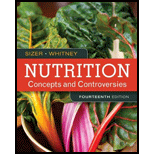
Nutrition: Concepts and Controversies - Standalone book (MindTap Course List)
14th Edition
ISBN: 9781305627994
Author: Frances Sizer, Ellie Whitney
Publisher: Brooks Cole
expand_more
expand_more
format_list_bulleted
Concept explainers
Question
Chapter 3, Problem 8SC
Summary Introduction
Introduction:
In the multicellular organism, the immune system is mainly comprised of the cells known as white blood cells, which are also known as leucocytes. These cells are produced by the hemopoietic stem cells in the bone marrow which mainly function in attacking the foreign invaders, which harm the human body.
Expert Solution & Answer
Trending nowThis is a popular solution!

Chapter 3 Solutions
Nutrition: Concepts and Controversies - Standalone book (MindTap Course List)
Ch. 3 - Moderate alcohol use has been credited with...Ch. 3 - Your daughter is leaving for college in the fall....Ch. 3 - Cells a. are self-contained, living units. b....Ch. 3 - Each gene is a blueprint that directs the...Ch. 3 - Prob. 3SCCh. 3 - Prob. 4SCCh. 3 - Hormones a. are rarely involved in disease...Ch. 3 - Prob. 6SCCh. 3 - Prob. 7SCCh. 3 - Prob. 8SC
Knowledge Booster
Learn more about
Need a deep-dive on the concept behind this application? Look no further. Learn more about this topic, health-nutrition and related others by exploring similar questions and additional content below.Similar questions
- Distinguish between a. neutrophil and macrophage b. cytotoxic T cell and natural killer cell c. effector cell and memory cell d. antigen and antibodyarrow_forwardBlood Types Are Determined by Cell-Surface Antigens Is it more important that transfused blood have antigens that will not react with the recipients antibodies, or antibodies that will not react with the recipients antigens?arrow_forwardMatch the immunity concepts: __________ inflammation __________ antibody secretion __________ phagocyte __________ immunological memory __________ vaccination __________ allergy a. neutrophil b. plasma cell c. nonspecific response d. purposely causing memory cell production e. basis of secondary immune response f. nonprotective immune responsearrow_forward
- The ability to develop a secondary immune response is based on ______. a. memory cells b. circulating antibodies c. plasma cells d. effector cytotoxic T cells e. mast cellsarrow_forwardA patient has been experiencing severe, persistent allergy symptoms that are reduced when she takes an antihistamine. Before the treatment, this patient was likely to have had increased activity of which leukocyte? basophils neutrophils monocytes natural killer cellsarrow_forwardMatch the immune cell with its main function. ___dendritic cell a. professional phagocyte ___B cell b. antigen-presenter ___helper T cell c. activates other lymphocytes ___NK cell d. makes antibodies ___macrophage e. kills ailing body cells that lack MHC markersarrow_forward
- Figure 42.11 Which of the following statements about T cells is false? Helper T cells release cytokines while cytotoxic T cells kill the infected cell. Helper T cells are CD4+, while cytotoxic T cells are CD8+. MHC II is a receptor found on most body cells, while MHC I is a receptor found on immune cells only. The T cell receptor is found on both CD4+ and CD8+ T cells.arrow_forwardThe study of the immune system is known as ______________________ .arrow_forwardThe Adaptive Immune Response Is a Specific Defense Against Infection Identify the components of cellular immunity, and define their roles in the immune response.arrow_forward
- Blood Types Are Determined by Cell-Surface Antigens A patient of yours has just undergone shoulder surgery and is experiencing kidney failure for no apparent reason. You check his chart and find that his blood is type B, but he has been mistakenly transfused with type A. Explain why he is experiencing kidney failure.arrow_forwardWhich of the following leads to the redness of inflammation? increased vascular permeability anaphylactic shock increased blood flow complement activationarrow_forwardWhich type of T cell is most effective against viruses? Th1 Th2 cytotoxic T cells regulatory T cellsarrow_forward
arrow_back_ios
SEE MORE QUESTIONS
arrow_forward_ios
Recommended textbooks for you
 Human Biology (MindTap Course List)BiologyISBN:9781305112100Author:Cecie Starr, Beverly McMillanPublisher:Cengage Learning
Human Biology (MindTap Course List)BiologyISBN:9781305112100Author:Cecie Starr, Beverly McMillanPublisher:Cengage Learning Human Heredity: Principles and Issues (MindTap Co...BiologyISBN:9781305251052Author:Michael CummingsPublisher:Cengage Learning
Human Heredity: Principles and Issues (MindTap Co...BiologyISBN:9781305251052Author:Michael CummingsPublisher:Cengage Learning Human Physiology: From Cells to Systems (MindTap ...BiologyISBN:9781285866932Author:Lauralee SherwoodPublisher:Cengage Learning
Human Physiology: From Cells to Systems (MindTap ...BiologyISBN:9781285866932Author:Lauralee SherwoodPublisher:Cengage Learning Comprehensive Medical Assisting: Administrative a...NursingISBN:9781305964792Author:Wilburta Q. Lindh, Carol D. Tamparo, Barbara M. Dahl, Julie Morris, Cindy CorreaPublisher:Cengage Learning
Comprehensive Medical Assisting: Administrative a...NursingISBN:9781305964792Author:Wilburta Q. Lindh, Carol D. Tamparo, Barbara M. Dahl, Julie Morris, Cindy CorreaPublisher:Cengage Learning

Human Biology (MindTap Course List)
Biology
ISBN:9781305112100
Author:Cecie Starr, Beverly McMillan
Publisher:Cengage Learning

Human Heredity: Principles and Issues (MindTap Co...
Biology
ISBN:9781305251052
Author:Michael Cummings
Publisher:Cengage Learning

Human Physiology: From Cells to Systems (MindTap ...
Biology
ISBN:9781285866932
Author:Lauralee Sherwood
Publisher:Cengage Learning


Comprehensive Medical Assisting: Administrative a...
Nursing
ISBN:9781305964792
Author:Wilburta Q. Lindh, Carol D. Tamparo, Barbara M. Dahl, Julie Morris, Cindy Correa
Publisher:Cengage Learning
